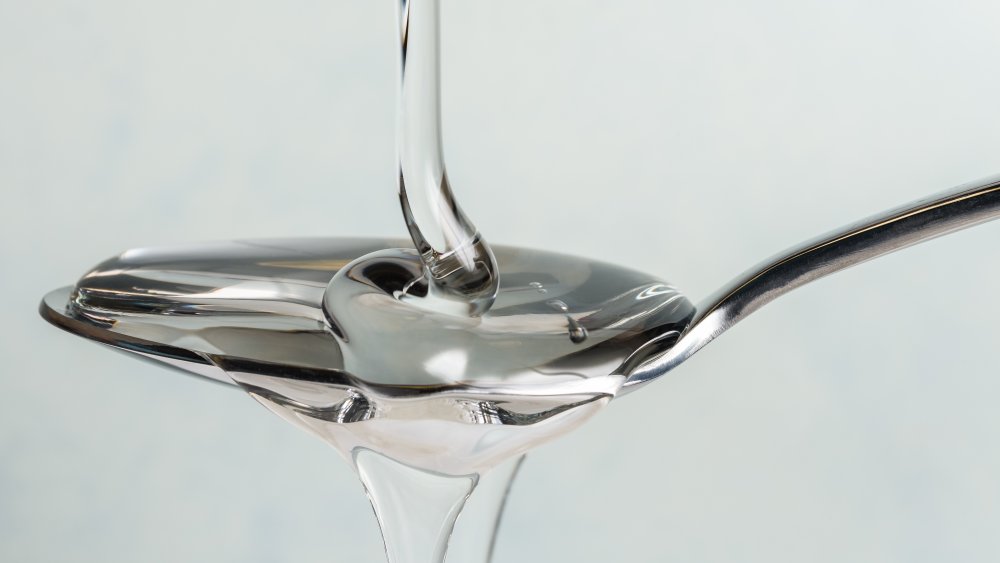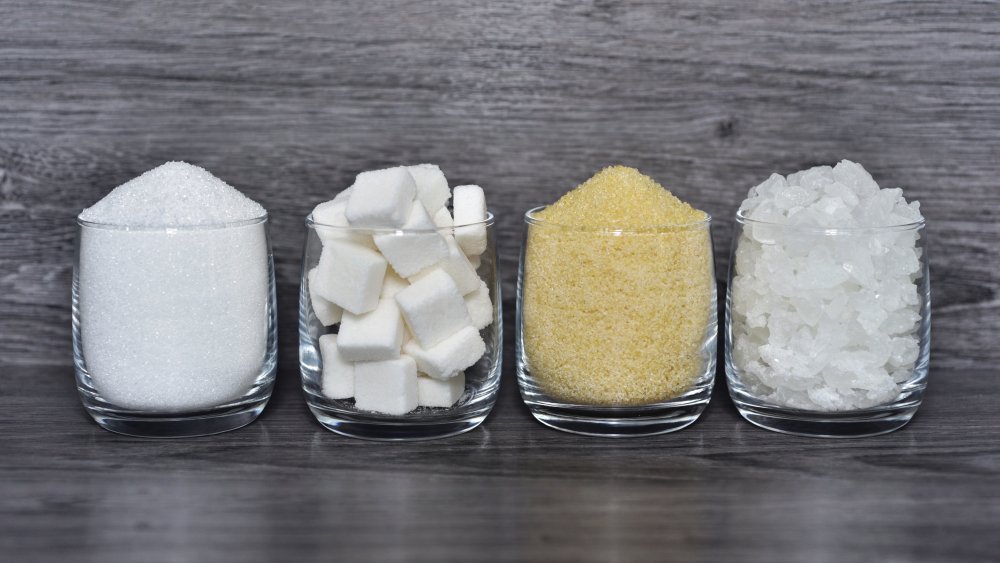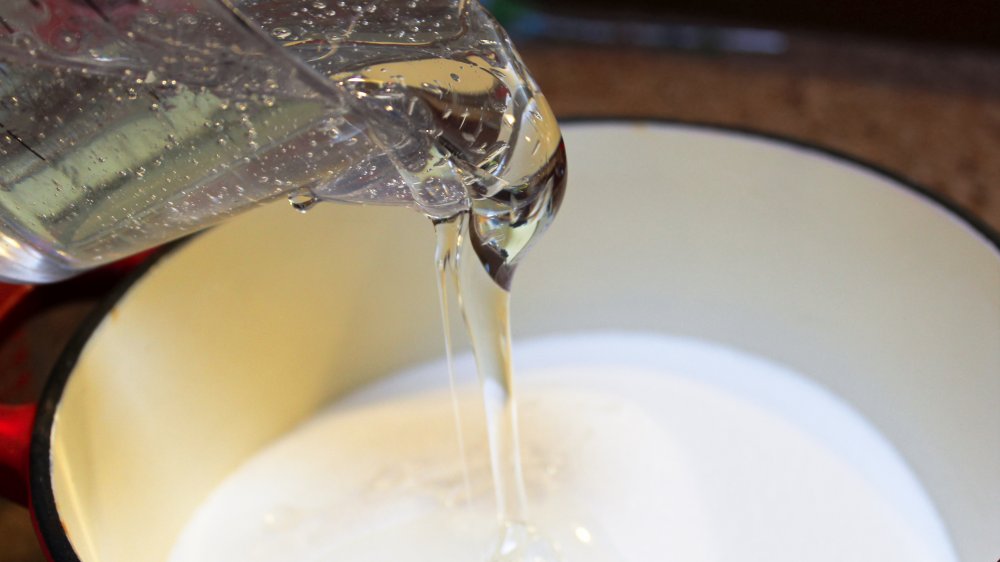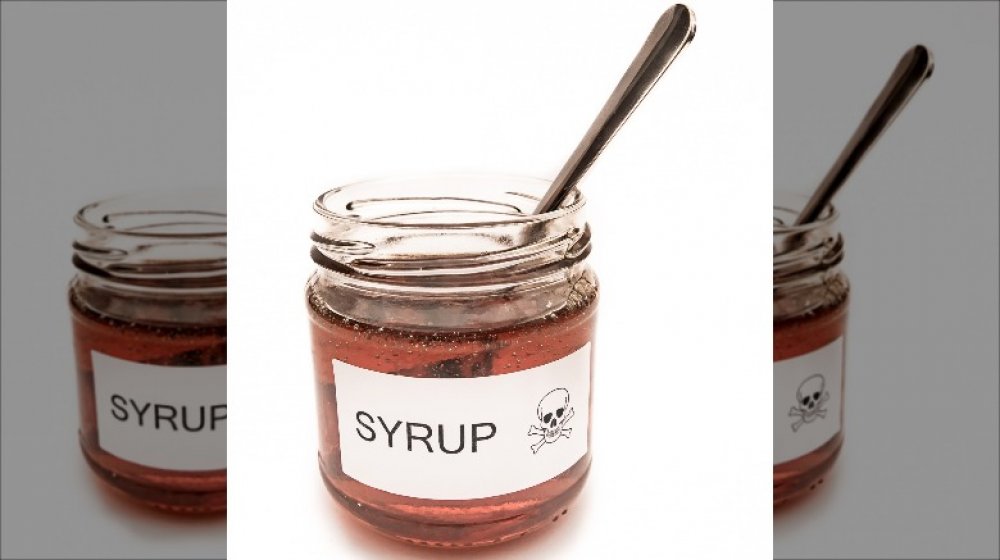Corn Syrup Vs. High Fructose Corn Syrup: What's The Difference?
Have you ever tried to bake, say, a pecan pie, only to be horrified by the fact that one of the main ingredients the recipe called for was corn syrup? There has been so much bad press regarding high fructose corn syrup (HFCS) that anything with a similar name is automatically looked upon with a great deal of suspicion. So what is corn syrup, anyway, and is there just one kind, or two? And are they both equally bad for you?
The short answer is — no. Plain old corn syrup that you can buy in the supermarket baking section isn't something akin to poison. It's not exactly health food, but it's no worse for you than any other type of sugar. The long answer? Strap in, folks, This is going to involve some chemistry terms, and it could prove to be an issue for anyone with particularly bad memories of high school science class.
The different types of sugar
Fine Cooking explains that there are three types of sugar: sucrose, glucose, and fructose. Sucrose is plain old table sugar, and is what is known (to those who enjoy using scientific terminology) as a disaccharide, meaning it consists of two types of molecules joined together. These molecules are glucose and fructose. The sucrose we use at home, as well as the kind found in most processed foods, is usually extracted from either sugar cane or sugar beets, although it is found in its natural state in many types of fruits, vegetables, and grains.
Both glucose and fructose exist in monosaccharide forms. Glucose, according to Healthline, is the body's preferred source of carb-based energy. Glucose is the least sweet of the three forms of sugar, and in foods will usually be bound to another simple sugar to form either polysaccharide starches or disaccharides such as lactose or sucrose. Glucose in processed foods often appears in the form of dextrose, a sweetener extracted from cornstarch. Fructose, the sweetest form of sugar, is naturally found in fruits, root vegetables, and honey. It's most often found in processed foods in the form of high-fructose corn syrup.
The corn syrup we use in the kitchen
Corn syrup used in home baking and candy-making is typically made from corn-extracted glucose suspended in water. It is used in recipes place of table sugar because it is less prone to crystallizing. You can, if need be, substitute a homemade version made from granulated sugar dissolved in hot water, but it's not the best choice for making something like fudge where you don't want the sugar in the final product to crystallize. Brown rice and golden syrup used in place of corn syrup will help to prevent crystallization, although they will add their own flavors to your candy.
According to an FAQ published by leading corn syrup manufacturer Karo, both the light and dark varieties of their product, which have been around for over 100 years, have never contained high-fructose corn syrup. At some point in the 1970s, HFCS was added to the reduced-calorie Karo Lite as well as to Karo Pancake Syrup. Due to consumer requests, the HFCS has now been removed from the Lite product, although it is still included in Karo Pancake Syrup.
Why high-fructose corn syrup is the 'bad' kind
High-fructose corn syrup, which is found in numerous processed foods, is primarily used by manufacturers — surprise! — as a cost-cutting measure. Because fructose is the sweetest form of sugar, it stands to reason that increasing the fructose content of corn syrup would mean that you don't need to use as much of it to get the same amount of sweetening. The problem with consuming more fructose than glucose is that fructose, unlike glucose, can't be used by the body until the liver converts it into a more easily-absorbed form.
Increasing fructose intake puts added strain on that organ and can lead to liver disease. Excess fructose consumption can also increase insulin resistance, which is linked to the development of type 2 diabetes. What's more, fructose does not send the same "I'm full — stop eating!" signal to the brain that glucose does, so ingesting products containing HFCS can lead to overeating and subsequent weight gain.
While it may not be easy to avoid HFCS altogether, it's generally a good idea to cut down if you can. As far as cooking with corn syrup goes, though — no worries, it's not particularly dangerous in and of itself. Of course, the candies, cookies, and pies you might make with it can lead to health issues if you constantly overindulge.



